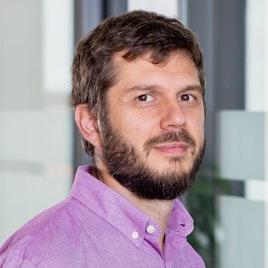An Interview with Jordi Vaquer, Director of the Open Society Initiative for Europe
By Eleanor Kelly & Jordi Vaquer

You are joining the Open Society Foundations from the Barcelona Centre for International Affairs (CIDOB). Could you tell us about your work there?
CIDOB has a special character amongst international relations think tanks. It was born 40 years ago under the dictatorship of Franco and aimed to open up minds in Barcelona at a time of grim oppression. CIDOB is today a genuine product of civil society activists who, through decades of hard work and with private and public help, managed to build a center for research, publications, and debate about Europe and the world that has become a well established presence, both in the city and in the European foreign policy debates scene. In the four years I have been the director of CIDOB the world and our immediate neighborhood, Europe and North Africa, have changed dramatically, and we have adapted our work to reflect those changes. Issues of democratic quality have become a central concern, in regions of specific interest (North Africa, Eastern Europe, Latin America, Central Asia) and, in particular, in the European Union itself.
Spain has been at the center of much of the recent turmoil in Europe. What everyday changes have you noticed in Barcelona and elsewhere?
The crisis that Spain faces, with a 25 percent unemployment rate and the economy in free fall, is out of proportion with the undeniable problems of competitiveness and good governance that the country needs to address. Society has proved resilient, with the help of the existing welfare state but also through strongly united families. In politics we have not witnessed a noticeable increase in xenophobia, hate discourse, or right-wing populism as seen in many other corners of Europe, but there is deep unease with the political system and the management of the crisis, which runs in at least three directions. One, is the criticism about the unfair distribution of austerity and of the costs of the crisis, which mostly fall on the weakest people, who tend to be young, immigrant, unemployed, and/or poor. This is the subject of much political mobilization, in particular from trade unions and the Left. The second is the dramatic drop in trust for politicians and the thirst for a regeneration of democracy—as expressed by the 15-M movement, internationally known as Indignados. And the third is specific to Catalonia: Support for independence from Spain has surged to unprecedented levels.
When did you first encounter the Open Society Foundations?
My first experience with the Open Society Foundations was in the Balkans and the former Soviet states. The local Open Society foundation was often our first port of call for research, a reliable source of advice and independent analysis about the country and for contacts in the local civil society. Lately, however, I have been mostly exposed to the Open Society Foundations’ work in the European Union, and in particular to the research and debates about the state of European democracy. I even participated directly in a study funded by the Foundations about new forms of protest in Europe or, as we called it, the bubbling up of subterranean politics in Europe.
You are from Catalonia and worked for five years for the international affairs department at the Government of Catalonia. Would you call yourself European?
Yes, I feel European, as do an overwhelming majority of Catalans. There is no contradiction between feeling Catalan and European; in most cases, there is not even a perceived contradiction between feeling Catalan and Spanish either, as a large majority of Catalans feel that they have some combination of both identities. I feel comfortable with overlapping, hybrid, mixed, and even contradictory constellations of identities (individual or collective, national or religious, gender or ethnic, permanent or temporary), for myself and for others, and I sense they are slowly becoming the norm rather than the exception. European is one additional identity in that rich mix.
You are a Twitter enthusiast (@jordivaquer) and also contribute to El País. What role do you think media and social media can play in the debate on Europe’s future?
Media and social media can play almost any role in the debate on Europe’s future. Twitter is a great resource for alternative information, but it is also a place where nuance is often sacrificed to the 140-characters rule, with disastrous simplifications of complex policy issues. Facebook is a fantastic tool for civil society mobilization, but it has also become an effective channel for xenophobic populism. Traditional media are an indispensable layer of democratic political debate, but they can be captured by political and economic interest to stifle alternative discourses. I see all sorts of media as a space up for grabs for those with enthusiasm and ideas, not just for those with power and money. In traditional and new media I feel that we already have the prime material to build a meaningful European debate that transcends the narrow bounds of nation-states.
Until May 2021, Eleanor Kelly was the regional head of communications for the Open Society Foundations.

Until May 2022, Jordi Vaquer was the director for Global Foresight and Analysis at the Open Society Foundations.


